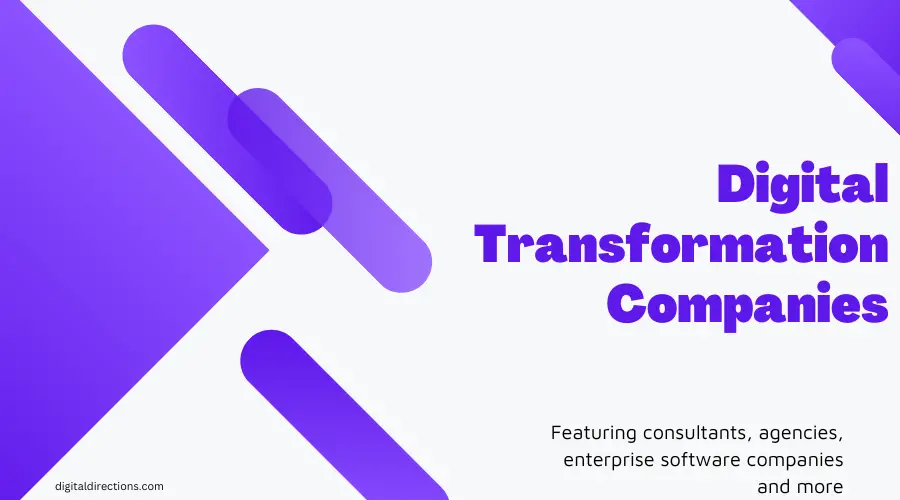In this post, we’ll look at two terms that are often used interchangeably: digital transformation and digital disruption.
However, although these concepts are related, there are some fundamental differences between their actual meanings.
To illustrate these differences, below we’ve gathered several examples of digital transformation and digital disruption from the business world.
First, the basics:
Digital Transformation vs. Digital Disruption
Digital transformation refers to using digital technologies (i.e. cloud technology, AI, IoT, big data, etc.) to fundamentally change how an individual business or organization operates and delivers value to its customers.
In contrast, digital disruption refers to the emergence of new digital technologies or business models that disrupt entire markets or industries.
To get a clearer picture of this distinction, let’s look at some examples.
Digital Transformation
Digital transformation can take many forms, depending on the needs of a specific business or industry.
For example, digital transformation occurs when:
- A retail company decides to adopt an online shopping model, implement e-commerce technology, and provide home delivery services to better meet the needs of its customers and remain competitive.
- A manufacturing company that historically relied on legacy systems and manual production processes transitions to advanced robotics and process automation technology to speed up production and increase efficiency.
- A medical provider makes the switch from a paper based workflow to an EMR (electronic medical records) system, and provides telemedicine through secure patient portals to improve the quality and accessibility of care for its patients. [Example: The NCH Healthcare System switched to an EMR to improve access for local patients]
- A trucking company implements innovative tracking tools and predictive analytics to monitor freight and improve safety. [Example: XPO’s piecemeal tracking to monitor individual pallets]
- A bank uses AI and machine learning to better understand its customers, improve risk management and improve fraud detection capabilities.
- A government agency moves to an e-government system (E-Gov) to enhance the access to and delivery of government information and services to citizens.
- A manufacturing and logistics company implements IoT to improve supply chain management and increase visibility into its production processes.
Find more examples of how digital transformation can impact businesses in different industries right here.
As you can see, all of these examples involve the use of certain technologies to change (and hopefully improve) aspects of how the organization operates or interacts with customers.
Digital Disruption
Unlike digital transformation, the following examples demonstrate how a new digital business model can disrupt an entire market structure and shake up the status quo:
- The rise of ride-sharing services like Uber and Lyft disrupted the traditional taxi industry.
- The emergence of online marketplaces like Amazon and eBay disrupted the traditional retail industry and opened up the gates to widespread e-commerce adoption.
- The proliferation of streaming services like Netflix, Hulu, Spotify, and many more disrupted the traditional television, film, and music industries.
- The rise of social media platforms like Facebook, Twitter and Instagram disrupted the traditional media industry and changed how people consume and share information.
- The emergence of cloud computing services like AWS and Microsoft Azure disrupted the traditional IT infrastructure market and made it easier for companies to access cloud computing power and storage on demand.
- The proliferation of mobile technology has completely disrupted the telecommunications and photography industry and led to the widespread adoption of smartphones and other mobile devices.
- The rise of cryptocurrency and blockchain technologies are trying to disrupt the traditional financial industry by introducing new forms of digital currency and decentralized financial systems.
In these cases, entire market landscapes were altered, and preexisting technologies were pushed toward obsolescence, due to the emergence of innovative new digital business models and technologies.
When Digital Disruption Leads to Digital Transformation (and vice versa)
It’s not always the case that disruption leads to transformation or vice versa. Remember, these are two related but distinct concepts, and their relationship will vary depending on the situation.
But, in some cases, digital disruption may lead to digital transformation.
For example, if a new technology or business model emerges that disrupts a particular industry, the companies operating in that industry may need to adopt new technologies or business models to stay competitive.
You can easily see how this has played out with streaming services. Once a disruptive concept, most traditional media companies now offer streaming platforms as well.
Conversely, digital transformation may also drive digital disruption.
For example, if a company successfully transforms its operations by adopting new digital technologies, it may can gain a competitive advantage over its rivals.
This could trigger a broader industry disruption and challenge the existing market structure, potentially leading to new business models and more innovation opportunities.
Overall, the relationship between digital transformation and disruption is complex and dynamic. It’s up to your organization to keep informed and stay ahead of the digital curve.



